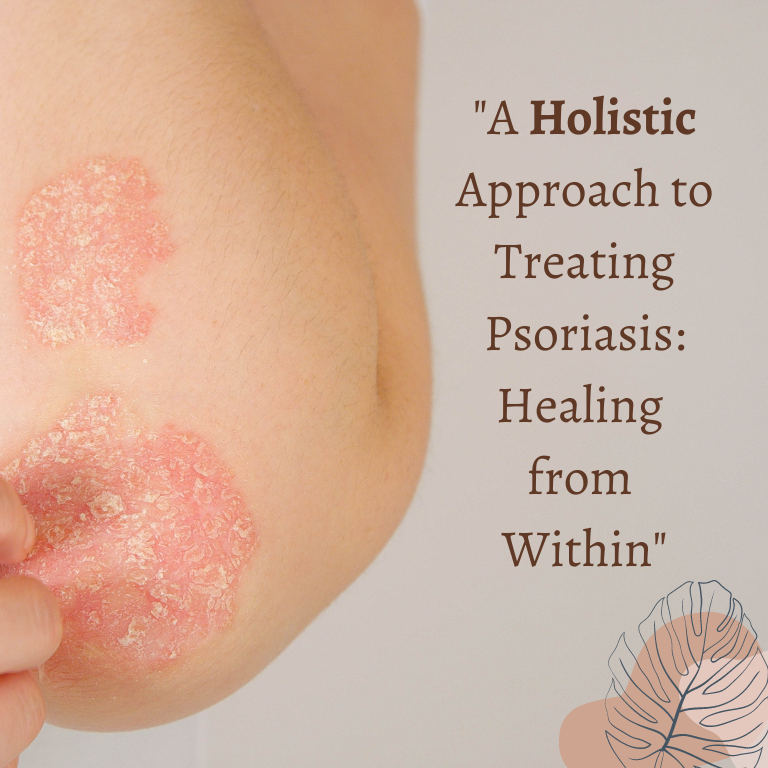
“A Holistic Approach to Treating Psoriasis: Healing from Within”
Psoriasis is a chronic autoimmune condition that affects the skin. It happens when the immune system mistakenly attacks healthy skin cells, causing them to build up rapidly on the surface of the skin.
It results in thick, red, scaly patches that can be itchy, painful, and sometimes even bleed.

Psoriasis is a non-contagious condition, and while it can affect people of all ages and genders, it usually appears between the ages of 15 and 35. The exact cause of psoriasis is not fully understood, but genetics, environmental factors, and the immune system all seem to play a role in its development.
If you wish to learn about psoriasis in detail, read this blog.
Several natural and holistic approaches can help manage the symptoms of psoriasis and improve overall skin health.
Let’s learn in detail:
Diet: An anti-inflammatory diet can help manage psoriasis symptoms. Inflammation is a critical factor in the development of psoriasis, so reducing inflammation in the body can help reduce the severity and frequency of psoriasis flare-ups.

By following an anti-inflammatory diet, you may also experience other health benefits that can improve your overall well-being.
An anti-inflammatory diet can help with typically includes a variety of whole, nutrient-dense foods rich in vitamins, minerals, and antioxidants. Here are some of the key components of an anti-inflammatory diet:
- Fruits and vegetables: These are rich in fiber, vitamins, and antioxidants that can help reduce inflammation in the body. Aim for a variety of colors to ensure a wide range of nutrients.
- Healthy fats: Include sources of healthy fats such as fatty fish, nuts, seeds, and olive oil. These foods contain omega-3 fatty acids, which have anti-inflammatory properties.
- Whole grains: Choose whole grains like quinoa, brown rice, and whole wheat bread instead of refined grains.
- Lean protein: Choose lean protein sources such as chicken, fish, legumes, and tofu.
- Herbs and spices: Use herbs and spices like turmeric, ginger, and garlic to add flavor to your meals. These foods have natural anti-inflammatory properties.
- Avoid processed foods: Processed and packaged foods often contain high amounts of added sugars, sodium, and unhealthy fats that can increase inflammation in the body.
Supplements
Some dietary supplements may help to manage symptoms.

Here are some supplements that have been studied for their potential benefit in managing psoriasis:
- Omega-3 fatty acids: These are found in fatty fish, nuts, and seeds and have anti-inflammatory properties. Omega-3 supplements may help reduce inflammation in the body, which can reduce the severity of psoriasis symptoms.
- Vitamin D: Vitamin D is vital for skin health and immune function. People with psoriasis often have low vitamin D levels. Some studies have suggested that vitamin D supplements may improve symptoms.
- Probiotics: Probiotics are beneficial bacteria that live in the gut and can support healthy immune function. Some studies have suggested that probiotics may help to reduce inflammation in the body, which can improve psoriasis symptoms.
- Curcumin: Curcumin is a compound found in turmeric that has anti-inflammatory properties. Some studies have suggested that curcumin supplements help to reduce inflammation and improve psoriasis symptoms.
- Zinc: Zinc is an essential mineral for immune function and skin health. Some studies have suggested that zinc supplements help to reduce inflammation and improve psoriasis symptoms.
Stress management
Managing stress is essential to maintaining overall health and well-being.

Here are some stress management techniques that can be helpful:
- Exercise: Physical activity can help to reduce stress and improve mood by releasing endorphins in the body. Exercise can take many forms, including walking, jogging, yoga, or strength training.
- Mindfulness meditation: Mindfulness meditation involves focusing on the present moment and paying attention to thoughts and sensations without judgment. Practicing mindfulness can help to reduce stress and improve overall mental health.
- Deep breathing: Deep breathing exercises can help to reduce stress and promote relaxation. Try breathing in slowly through the nose, holding the breath for a few seconds, and then breathing out slowly through the mouth.
- Time management: Managing time effectively can reduce stress by allowing for more efficient use of time and reducing the feeling of being overwhelmed. Prioritizing tasks, breaking them into smaller steps, and delegating responsibilities are helpful.
- Relaxation techniques: Activities like reading, taking a bath, or listening to music can help to reduce stress and promote relaxation. Find enjoyable and calming activities, and make time for them regularly.
- Social support: Talking to friends, family, or a mental health professional can help to reduce stress by providing a supportive outlet to discuss problems and find solutions.
Remember that not all stress management techniques work for everyone, and it may take some trial and error to find what works best for you. It’s important to prioritize self-care and make time for stress management techniques on a regular basis to maintain overall health and well-being.
Topical remedies

Natural ingredients, such as coconut oil, aloe vera, and honey, can be used topically to soothe irritated skin and provide relief from itching and discomfort.
- Here are some examples:
- Aloe vera: Aloe vera has anti-inflammatory properties and can soothe the skin. Apply fresh aloe vera gel to the affected area.
- Apple cider vinegar: Apple cider vinegar has antimicrobial properties that can help relieve itching and reduce inflammation. Dilute the vinegar with water and apply it to the affected area with a cotton ball.
- Oatmeal: Oatmeal has anti-inflammatory properties and can soothe the skin. You can take an oatmeal bath or make a paste with oatmeal and water and apply it to the affected area.
- Tea tree oil: Tea tree oil has antiseptic and anti-inflammatory properties. Mix a few drops of tea tree oil with a carrier oil such as coconut oil and apply it to the affected area.
- Turmeric: Turmeric has anti-inflammatory properties and can help reduce redness and scaling. Mix turmeric with water to make a paste and apply it to the affected area.
- Calendula: Calendula is a natural herb with anti-inflammatory, antimicrobial, and antioxidant properties. It has been traditionally used to soothe and heal various skin conditions, including psoriasis. It can be applied topically as a tincture, oil, cream, or salve. Calendula can also be consumed in the form of homeopathic potency, tea, or supplements- you can read my other blog about calendula’s significant benefits in detail.
Homeopathy is a form of naturopathic medicine that uses highly diluted natural substances to stimulate the body’s natural healing processes. Some people with psoriasis may turn to homeopathy as a complementary or alternative treatment for their condition.

In homeopathy, remedies are chosen based on the individual’s specific symptoms, emotional state, overall health, and other factors.
Some of the most commonly used remedies for psoriasis include Arsenicum album, Graphites, kali bichromicum, and Sulfur.
Sulfur is excellent for almost all skin issues – read this blog for detailed information.
Herbs

Several herbs are commonly used to help manage the symptoms of psoriasis. Some of the most well-known include:
- Turmeric: This spice contains curcumin, which is a potent anti-inflammatory compound. Turmeric may help reduce inflammation and improve skin health in people with psoriasis.
- Aloe Vera: Aloe vera has soothing and moisturizing properties, which may help reduce itching, scaling, and redness associated with psoriasis.
- Chamomile: Chamomile has anti-inflammatory and calming effects, which may help soothe irritated skin and reduce itching in people with psoriasis.
- Licorice: Licorice contains glycyrrhizic acid, which has anti-inflammatory and soothing properties. Some research has suggested that licorice may help reduce redness, itching, and scaling associated with psoriasis.
- Calendula: Calendula has anti-inflammatory and wound-healing properties, which may help soothe irritated skin and promote healing in people with psoriasis.
Liquid Intake for Psoriasis

Staying hydrated is essential for overall health, and it is vital for people with psoriasis. Adequate hydration can help keep the skin moisturized and prevent dryness, which can exacerbate psoriasis symptoms. Here are some tips for optimizing liquid intake for psoriasis:
- Drink plenty of water: Water is the best option for staying hydrated. Aim to drink at least 8 glasses of water per day or more if you are active or in a hot environment.
- Limit sugary and caffeinated drinks: Sugary drinks such as soda and energy drinks can contribute to inflammation and worsening psoriasis symptoms. Caffeine can also dehydrate, so limiting your intake of coffee and tea is best.
- Incorporate hydrating foods: Some fruits and vegetables have high water content and can help you stay hydrated. Examples include watermelon, cucumber, and lettuce.
- Consider drinking herbal teas: Some herbal teas, such as chamomile and ginger tea, have anti-inflammatory properties that may help reduce psoriasis symptoms. Be sure to avoid any teas containing ingredients you are allergic to.
Gut affection

One of the holistic approaches to managing psoriasis is to address potential gut imbalances. However, it’s important to note that this should only be done under the guidance of an expert. The liver plays a vital role in processing toxins and waste products in the body. If it is not functioning correctly, it can lead to a buildup of these substances in the body. This can contribute to inflammation and exacerbate psoriasis symptoms.
It’s important to remember that natural and holistic approaches should not replace traditional medical treatments. Working with a doctor to develop an individualized treatment plan that considers the specific type of psoriasis and the severity of symptoms is essential. Additionally, some natural remedies may not be safe for everyone and may interact with medications, so it is vital to talk to a doctor before trying new treatments.
Avoiding harsh body washes and soaps can be helpful for people with psoriasis. Many conventional body washes and soaps contain harsh chemicals and fragrances that can irritate the skin and worsen psoriasis symptoms. Instead, it is recommended to use gentle, fragrance-free body washes and soaps that are specifically formulated for sensitive skin. Look for products that are free of sulfates, parabens, and other harsh chemicals, as these can be especially irritating for people with psoriasis.
Naturo Essentials Body & Hair Wash is a great option for people who are dealing with skin issues. It is Made with all-natural ingredients, it can be a good choice for people with psoriasis who are looking for a gentle, non-irritating cleanser for their skin and scalp.
Additionally, try to avoid using hot water and harsh scrubbing, as these can further dry out and irritate the skin. Instead, use lukewarm water and gentle washing motions to minimize irritation and protect the skin’s natural moisture barrier.
“Psoriasis is a complex disease which can result from a variety of contributing factors. To achieve a successful and holistic treatment outcome, I offer my support to help you identify the root cause and design a comprehensive treatment plan. This plan may encompass lifestyle modifications, topical treatments, and other natural and safe remedies with the goal of improving your skin health without any adverse side effects.” – email me at contact@holisticskinwellness.com for further enquiry.
